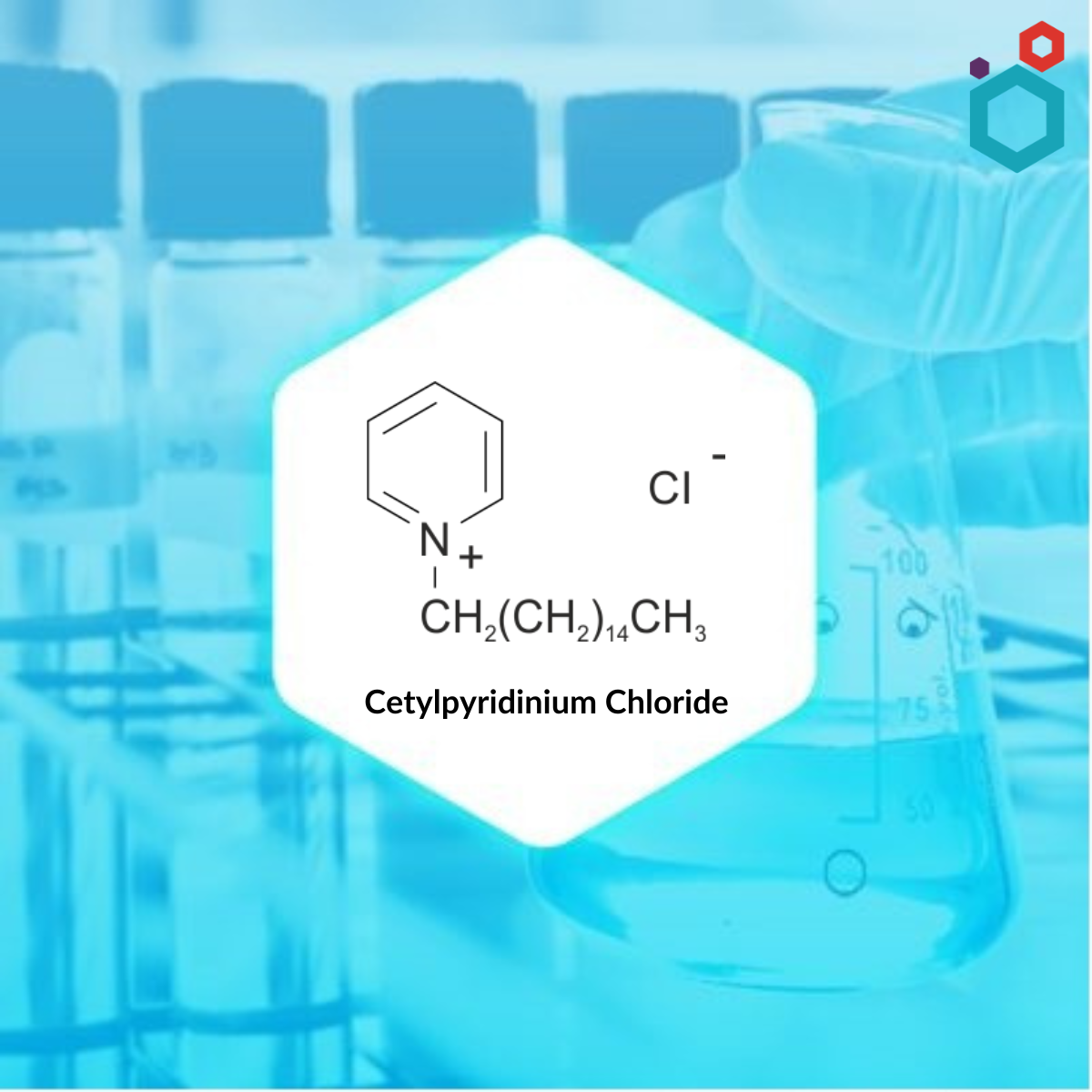
What is Cetylpyridinium Chloride?
Cetylpyridinium chloride (CPC) is a pyridinium salt that has N-hexadecylpyridinium as the cation and chloride as the anion. It is a cationic quaternary ammonium compound that is commonly used as an antimicrobial agent in various products such as mouthwash, toothpaste, and other oral care products, as well as personal care products, disinfectants, and pharmaceuticals.
It is approved for use by the United States Food and Drug Administration (FDA) and the European Union (EU).
| PRODUCT SPECIFICATIONS | |
|---|---|
| Name of Product | Cetylpyridinium Chloride |
| IUPAC Name | 1-hexadecylpyridin-1-ium;chloride |
| Synonyms | 1-Hexadecylpyridinium chloride; hexadecylpyridinium chloride; Pristacin; Cetamium; Ceprim; Dobendan; Pyrisept; Tserigel; Aktivex; Biosept; Cepacol |
| CAS No | 123-03-5 |
| Molecular Formula | C21H38ClN |
| Molecular Weight | 340.0 g/mol |
| Available variants | Cetylpyridinium Chloride Monohydrate (6004-24-6) |
| Pubchem CID | 31239 |
| Pubchem SID | 481739574 |
Chemical Properties
| SR. No | Criteria | Limit/Specification |
|---|---|---|
| 1 | Appearance (Form) | Solid Powder |
| 2 | Appearance (Color) | White or Almost White |
| 3 | Solubility | Very soluble in water and chloroform |
| 4 | Melting point | 77 °C (Anhydrous Form) 80-84 °C (Monohydrate Form) |
| 5 | Water Content (By Karl Fischer's Method) |
4.5-5.5% |
| 6 | Residue on Ignition | NMT 0.2% |
| 7 | Heavy Metals | NMT 0.002% |
| 8 | Assay | 99.0% to 102.0% |
Uses
- Cetylpyridinium Chloride is most commonly used in mouthwashes, toothpastes, and other oral care products such as lozenges, throat sprays, breath sprays, and nasal sprays due to its antibacterial properties. It helps to kill bacteria that cause bad breath, gum disease, and tooth decay.
- It has antiseptic properties and kill germs and other microbes, making it useful for avoiding tooth plaque and minimising gingivitis.
- It can also be used as a preservative in cosmetic and personal care products as it helps to prevent the growth of bacteria and other microorganisms that can cause spoilage.
- Additionally, it has been utilized in the production of certain insecticides as an active component.
Side effects
Although Cetylpyridinium Chloride (CPC) is generally considered safe when used in recommended doses, it can cause side effects in some individuals. Some of the side effects associated with its use include:
- Mouth irritation: It can cause irritation, dryness, or a burning sensation in the mouth, throat, and tongue, particularly if used in high concentrations or for a prolonged period.
- Staining of teeth: It can cause staining or discoloration of teeth, especially if used for a long time or in high concentrations.
- Taste alteration: It can alter the sense of taste and cause an unpleasant aftertaste or metallic taste in the mouth.
- Allergic reactions: Some individuals may develop an allergic reaction to CPC, which can cause symptoms such as itching, rash, swelling, or difficulty breathing.
FAQs
Q. Is Cetylpyridinium chloride safe?
The use of Cetylpyridinium chloride in oral health products is generally considered to be safe. However, it can cause some minimal side effects such as tooth staining and temporary loss of taste.
Q. Does Cetylpyridinium chloride kill good bacteria?
Cetylpyridinium chloride is a broad-spectrum antimicrobial agent that kills bacteria non-selectively. It can kill some beneficial bacteria but is not believed to significantly impact the overall balance of the oral microbiome.
Q. Is Cetylpyridinium chloride safe for dogs?
Cetylpyridinium chloride is considered to be safe for use in dogs for reducing dental plaque accumulation, calculus formation, and halitosis (bad breath).
Q. What is the difference between Cetylpyridinium chloride and Chlorhexidine?
Both Cetylpyridinium chloride (CPC) and Chlorhexidine are effective antimicrobial agents commonly used in oral care products. However, CPC is a milder and less potent antimicrobial agent that is suitable for routine oral care, while Chlorhexidine is more potent and is used in more severe cases of gum disease or infections.
Q. How does Cetylpyridinium chloride kill bacteria?
Cetylpyridinium chloride is a potent antimicrobial agent that works by disrupting the cell membranes and intracellular processes of bacteria and other microorganisms, ultimately leading to their death. It is attracted to the negatively charged membranes of bacteria and can penetrate them, causing the cell contents to leak out and eventually leading to their death.
Buy high purity Cetylpyridinium Chloride through Macsen Laboratories. For buying, send us an enquiry-
